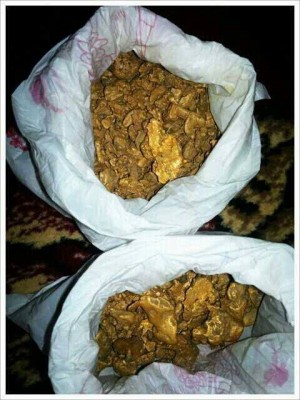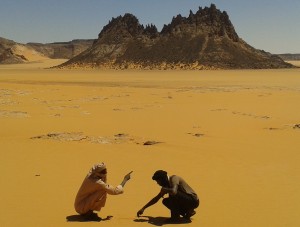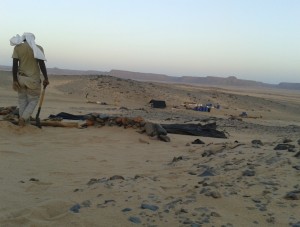By Jamal Adel.

Kufra, 24 October 2014:
A low-key gold rush has been under way in Libya’s southern borderlands and beyond, since the . . .[restrict]precious ore was discovered just over a year ago.
The original find in Messki, in the Tebu region of Chad’s Tebisti mountains has prompted scores of young men, largely from the Tebu community, to turn prospectors in a remote and unforgiving region crossed by the borders of Libya, Chad and Niger. The sun is so merciless that work generally takes place at night.
Not everyone who has set off prospecting has fully understood the challenges. “I was broke, ” Youssif Milo told the Libya Herald, “ I did not have a penny on me when some friends asked me to go with them to Messki to dig for gold”. The unmarried 34 year-old from Kufra figured he had nothing to lose and agreed to go along.
Moli explained that gold-prospecting is relatively simple. A serviceable Toyota, money to buy food, as well plenty fuel cans for the vehicle so water and wood for cooking can be fetched.
Moli said that because he could not pay anything in advance, he borrowed a friend’s metal detector and divided night-time prospecting sessions with him.
The key tool for the gold hunters is a specialised detector. These have been imported from the UAE in some numbers and cost around $3,000 each. Unlike standard detectors, the devices operate on high frequencies and have much more precise calibration. However a drawback to these expensive pieces of kit is that they are susceptible to dust, sand and being used in temperatures that can reach 48 degrees Celsius in the summer.
The Chadian Tebus do not allow foreign labourers to work the Messki region, said Moli. “But it is OK for you to work for yourself with a detector”. Though he does not specify how well he has done, he admits that he now owns his own Toyota and his own metal detector.
In March this year another, far more productive gold-bearing region was discovered in Brawo, a Tebu region in Niger.

“Brawo is very rich in gold” Mohammed Yessko from Ribyana told this newspaper, “ If you have necessary equipment and the guts, it can be very prosperous journey. I have made a good income in Brawo. But I never thought it will be that great”.
Indeed the courage needed to go after this gold does seem to be considerable. Apart from the hostile climate, the road across the Sahara from the Libyan border to Brawo is described as extremely dangerous. There has been a number of shooting incidents with Tebu militants. In addition the routes of drugs mafias pass through the area. Convoys of up to ten heavily-armed trucks pass through from Algeria and Mali.
A third mini- gold rush has been happening in Libya itself, in the Azzerri region, 250 kilometres south-west of the Kelinja Gate on the road to the Tebu village of Zwelah. The location however is desolate and the extreme temperatures make conditions for prospectors truly dire. The gold is to be found in rocky desert and generally lies around three metres below the surface. This may explain why the Azzerri gold field has proved less productive than Messki and Brawo.
A further challenge for gold hunter is the Kelinja Gate itself, one of four check points on the Libyan side of the border. The Gate, at the very start of the Tebisti mountain range, is the only way through to the south-west towns such as Um Aranib, Murzuk and Al-Qatroun. Manned by well-armed, self-appointed militias, the area around the check point is heavily mined.
It is unclear how much gold is being won from these three fields and what economic effect it is having. One economist has speculated that it has had a stabilising effect and boosted income per head. The gold miners themselves believe that there are still substantial untapped riches to be had.

Though gold is unlikely to rival the value of oil as a natural resource, it is being argued that the government needs to be thinking about attracting foreign investment to exploit the precious metal in an orderly manner. Security is clearly one big issue that will keep outside companies away. Yet locals believe that gold mines could transform the economic fortunes of southern Libya, bringing basic services, such as universal power connections, as well as better education, health provision and other local investments. [/restrict]








